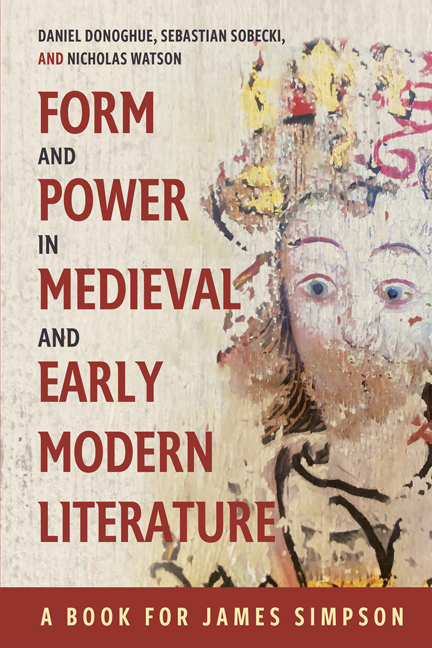Book contents
- Frontmatter
- Contents
- List of Illustrations
- Contributors and Editors
- Acknowledgments
- List of Abbreviations
- Simpson: An Interim Report
- PART I THE HERMENEUTICS OF RECOGNITION
- PART II GENRE AND FIGURE
- PART III CULTURE AND INSTITUTIONS
- PART IV REFORMATIONS
- James Simpson’s Publications from 1984 to 2024
- Bibliography
- A Note on the Bloomfield Conferences
- General Index
- Tabula Gratulatoria
10 - In Place of the Past: Saint Erkenwald’s Versions of Conversion
Published online by Cambridge University Press: 17 May 2024
- Frontmatter
- Contents
- List of Illustrations
- Contributors and Editors
- Acknowledgments
- List of Abbreviations
- Simpson: An Interim Report
- PART I THE HERMENEUTICS OF RECOGNITION
- PART II GENRE AND FIGURE
- PART III CULTURE AND INSTITUTIONS
- PART IV REFORMATIONS
- James Simpson’s Publications from 1984 to 2024
- Bibliography
- A Note on the Bloomfield Conferences
- General Index
- Tabula Gratulatoria
Summary
Sainthood imprints itself on space. Michel de Certeau remarks that saints’ lives feature a “predominance of precise indications of place over those of time,” indications that anchor holy communities to the places of the saints’ lives and deaths. The seventh-century English saint, Erkenwald, is closely associated with three specific places: Barking and Chertsey, where he founded monasteries, and London, of which he was bishop from 675 to 693. The late eleventh-century Vita Sancti Erkenwaldi describes Erkenwald traveling constantly around his diocese, even when ill and needing to be carried on a litter; the mid-twelfth-century Miracula Sancti Erkenwaldi details the miraculous signs that appeared after the bishop's death to indicate that his final resting-place should be St. Paul's Cathedral in London, rather than either of the abbeys he had founded.3 Before and after the Norman Conquest, Erkenwald's body occupied various positions of honor in the evolving structure of St. Paul’s, coming to reside in an imposing Gothic-style tomb behind the high altar after the thirteenth-century reconstruction of the cathedral.
The monumental presence of Erkenwald's relics in London's civic space registers itself unmistakably in the topographic imagination of the fourteenth-century alliterative poem Saint Erkenwald. Yet, instead of the splendidly entombed body of the saint, the poem gives us its uncanny double, telling a story of how the miraculously incorrupt corpse of a judge from remote pre-Christian antiquity is discovered during the laying of the foundations of St. Paul's in seventh-century London, where Erkenwald is bishop. Erkenwald's enshrined relics are thus made out to occupy a space inhabited by other bodies in the past. The poem also represents Britain as the site of successive incursions and conversions – by Saxon invaders, then by Christian missionaries from Rome.
This essay argues that Saint Erkenwald defamiliarizes the ambient presence of Christianity in the fourteenth-century English context of the poem's composition in order to raise challenging questions about the grounds of Christianity's occupation of literal ground: in London, Britain, and the world at large. When Christ himself declared that his kingdom is not of this world (John 18:36), what justifies the occupation of space by the earthly Church, especially when such occupation follows the pattern of other territorial conquests such as the Saxon settlement?
- Type
- Chapter
- Information
- Form and Power in Medieval and Early Modern LiteratureA Book for James Simpson, pp. 183 - 200Publisher: Boydell & BrewerPrint publication year: 2024

